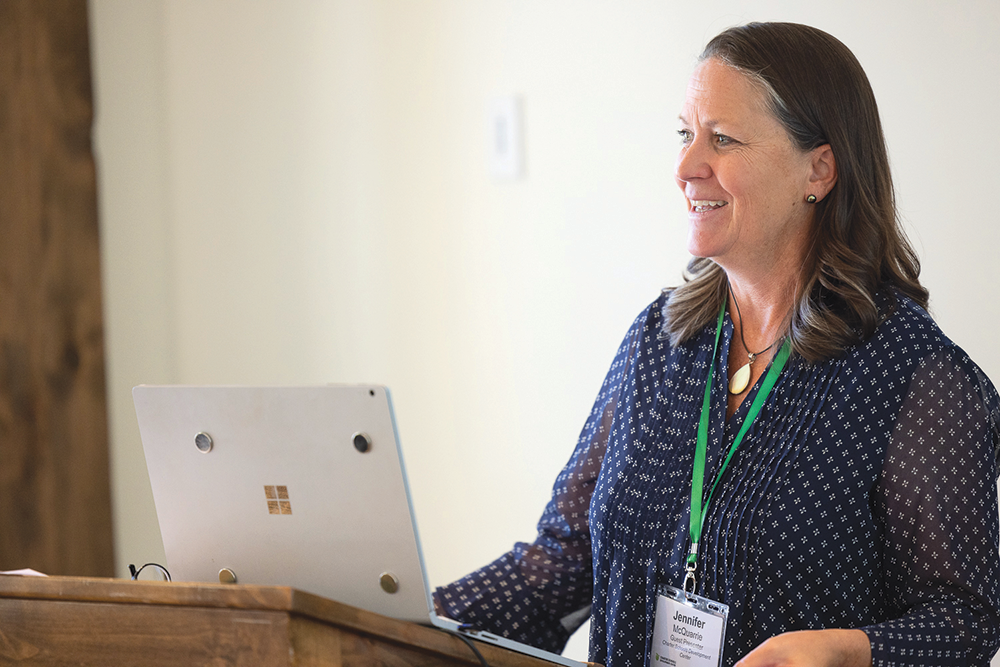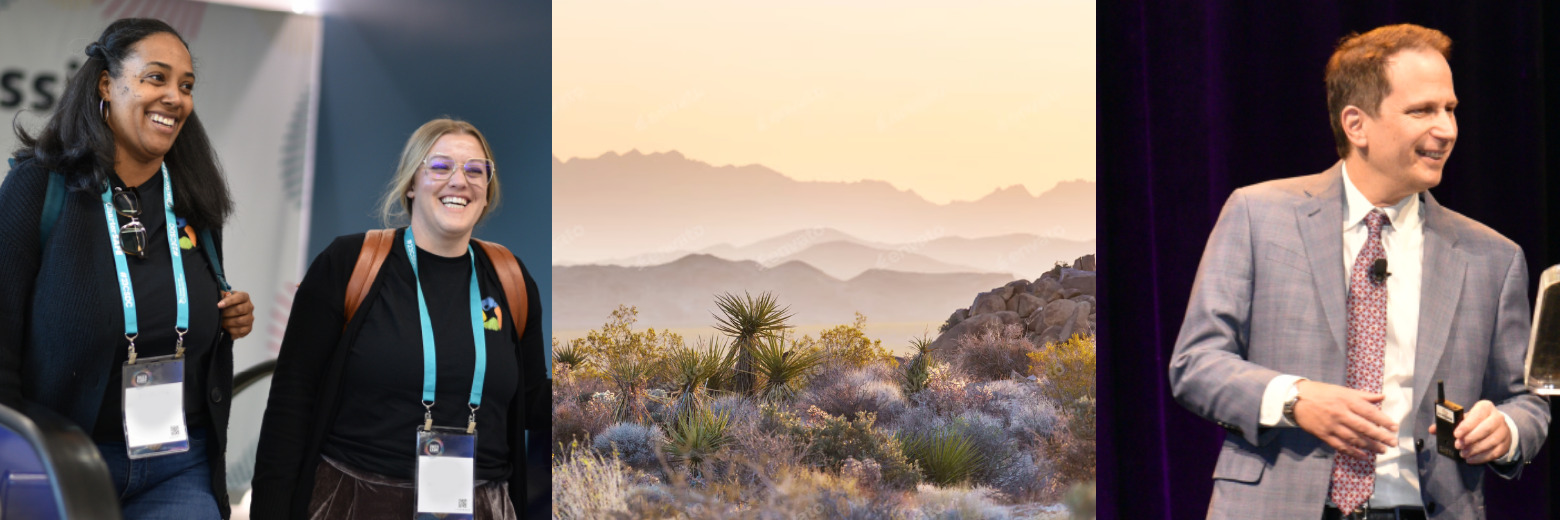
Share your knowledge and network with California’s charter school leadership.
The Call for Proposals (CFP) is open now! Submit your proposal by June 6 and make an impact on the California charter schools sector!
Manage Proposal
Why Present?
Presenting at the CSDC Conference is a great way to build capacity in the California charter school sector and to have a huge impact on the lives of students, faculty, and communities across the state.
Past presenters have said that the CSDC Conference is an especially great event for:
- Networking and connecting with school leaders from across California
- Imparting timely, actionable information to the leaders who can activate them at their school sites
- Building reputations as trusted thought-leaders in the sector
- Saving on registration via a special discounted rate* made available exclusively to presenters at this year’s conference
Who Presents?
CSDC seeks strong, experienced leaders within the charter sector who have insightful, timely, and critical content to share. The most valuable proposals will:
- Address content or topics listed in the CFP (see strands and topics)
- Be presented by charter school/sector leaders
- Share specific, proven best practices
- Provide actionable resources
- Describe specific challenges and how the school/charter organization/leader overcame them
- Offer real-world applications to operationalize valuable content
- Engage attendees with interactive components, workbooks, visuals, multiple presenters, and/or Q&A
Presentation Formats
- Breakout Sessions: 75-minute long sessions that cover topics critical to charter school operations; these make up most of the offered content scheduled throughout the conference.
- Learning Labs: 45-minute sessions hosted in our exhibit hall, designed to be full of energy, hands-on engagement, and provide opportunities for attendees to interact with their colleagues during exhibit hall hours on a niche topic.
Review the conference schedule.
Strands and Accepted Topics
Accountability & Renewal
- LCAP: best practices
- LCAP: how we solved a challenge
- Other
- Oversight: streamlined and sound
- Renewal and oversight data: getting on the same page with the authorizer
- Renewal data: making a case when first-glance data looks tough
- Renewal petition drafting: legal updates
- Renewal: building support
Educational Approaches
- Brain-based learning
- Build a strong Transitional Kindergarten program
- Effective flex-/nonclassroom-based approaches
- Effective Multi-Tiered Systems of Support (MTSS)
- Effective STEM education
- Innovative approaches (e.g., project-based learning)
- Instructional leadership & achieving mindset shift
- Leveraging technology
- Parents as partners in learning
- Promoting growth in core content areas
- Promoting growth in social emotional learning (explicit sequential instruction)
- Teaching values & handling controversy in the classroom
- Strong Career Technical Education programs
- Supporting the success of English Learners
- Supporting the success of students with disabilities
Student Support Systems
- Changing adult mindsets
- Developing and launching successful Community Schools
- Improving school attendance: what works
- Making student voice matter
- Promoting college readiness
- Restorative justice and positive behavior support
- School climate and student connectedness
- Student mental health needs, including crisis supports
- Understanding neurodiversity
Leadership, Governance & Legal
- Addressing teacher and administrator burnout
- Annual Audits
- Building a successful relationship with your authorizer
- Building effective charter leaders and leadership teams
- Charter school mergers
- Developing leadership succession plans
- Difficult conversations – how to have them
- Effective board management practices
- Equity audits
- Essential charter school policies
- Fiscal – Board Members and school finance
- Increasing racial diversity, equity, inclusion, and cultural competence among charter school and district administrators
- Leading change effectively
- Leading diverse, inclusive, equitable, and anti-racist organizations
- Legal and policy update
- Legal mistakes and how to avoid them
- Managing/recruiting volunteers
- Other
- Positive parent communication
- Special education compliance
- Strategic planning for charter schools
- Student leadership
- Succession planning for school leaders
- Successfully recruiting charter school board members
- Translating mission, vision, and values into practice
- Unions and charter schools
Policy & Advocacy
- Building charter school advocates: empowering educators and education partners to support charter schools at critical moments
- Changing the game: running for local school board or county office of education, starting a PAC or more
- Emerging issues: Federal, state, and local policies that could impact charter schools and public education
- Local Advocacy: Strategies for successful material revisions, MOUs, and authorizer policies
- Strengthening democracy: non-partisan civic engagement in schools
- Working together for a better future: coalitions, collaboration, and community-based solutions to big problems facing schools, youth, and families
School Operations
- Bond financing for charter school facilities
- Building and managing a sustainable food program
- Categorical funding
- Co-locating schools
- Cyber security
- District/charter leases
- Effectively navigating Prop 39
- Facilities fundamentals
- Facilities master planning
- Federal funding management
- Financing
- Fundraising
- How to have a successful audit
- Human Resources
- Independent study compliance
- Insurance coverage in a crisis
- Leveraging AI in school operations
- Liability trends and how to avoid them
- Managing a food program in a nonclassroom-based setting
- Managing Prop 28 Arts and Music in Education (AME) Funding
- Recruitment, enrollment, and retention strategies
- Risk management
- SB 740 facilities strategies
- School operations self-audits
- School safety
- Special education without breaking the bank
- Student admissions, lottery, and enrollment laws
- When and how to invest
Proposal Criteria, Review Process, and Resources
CSDC will only accept completed proposals submitted via the online portal, linked below. Proposals submitted any other way will not be accepted.
- Proposals must be received by deadline (see below)
- Limit of three (3) proposal submissions per individual or five (5) per organization unless with express permission from the programming committee
- According to CSDC policy, each accepted presenter will receive one (1) discounted conference registration; annual discounted rates may vary
- Presenters must confirm they have reviewed and agree to CSDC’s Diversity Guidelines
- Note: When submitting a proposal as a vendor or other support organization that works with charter schools, CSDC strongly encourages a co-presenting charter school client representative. CSDC prioritizes proposals with strong charter leaders as presenters.
Proposals will be reviewed by CSDC’s programming selection committee using the following criteria:
- Unique content that is aligned with current events and trending issues for the charter sector
- Aligns to strands/topics listed above
- Practical application
- Data on proven outcomes
- Specificity and quality of content
- A creative, catchy, and precise session title of no more than 15 words
- A clear, concise description that explains what is being addressed, the practice or evidence that will be demonstrated, and what tools, resources, or knowledge attendees will walk away with (session descriptions should be no more than 150 words)
- A clear objective—what attendees will learn because of your presentation
- Presenter(s) experience and expertise
- Interaction and opportunities for audience participation
- Quality handouts/tools for attendees to takeaway
- Level of commercial bias (if any)
Critical Presenter Deadlines
APR 18 | BEGIN PROPOSAL
The CFP for the 2025 CSDC Conference opens.
JUN 6 | SUBMIT PROPOSAL
Completed proposals must be submitted through the portal by 11:59PM PDT.
JUL 1 | RECEIVE DETERMINATION
By this date, CSDC will confirm accepted sessions via email. CSDC will also notify those whose sessions were not selected for this year’s conference.
JUL 18 | ACCEPT INVITATION
If invited, presenters must use the presenter portal to confirm their intention to present and finalize their profiles (titles, bios, social media links, and headshots along with any edits to session titles or descriptions) by this date. If invite is not accepted by this date, session will be canceled; CSDC will take a reasonable number of measures to contact an accepted presenting group before canceling.
Upon confirming their sessions, presenters are urged to:
- Register for the conference at the discounted presenter rate
- Book a flight to Palm Springs International Airport (PSP)
- Reserve a room under CSDC’s discounted room block at three host hotels. Beware of room block poachers! Trust only information posted on the CSDC Conference website and/or sent by CSDC (from the @chartercenter.org or @csdcconference.org domains), not third-party/unofficial entities claiming to offer discounts or accommodations.
- Review the schedule overview and stay tuned for programming going live in August!
AUG 1 | PROMOTE SESSION
All programming goes live on the conference website! Use CSDC-provided social cards to promote your session on social media.
SEP 11 OR SEP 16 | ATTEND TRAINING
Confirmed presenters must attend one of the two 30-minute presenter trainings listed below. (Links will be included in emails to presenters who have accepted their sessions by deadline above.)
- SEP 11 | 1:00-1:30PM PDT
- SEP 16 | 10:00-10:30AM PDT
SEP 30 | UPLOAD MATERIALS
Presentation files and resources uploaded to presenter portal by 5:00PM PDT.
OCT 6-8 | PRESENT SESSION
We can’t wait to see your presentation in Palm Springs on October 6-8!




